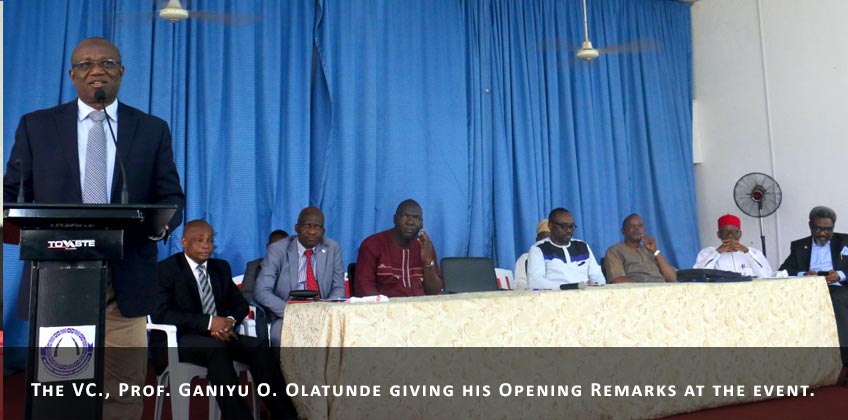As part of the on-going interventions of Professor Ganiyu Olatunde’s administration at ensuring that the lives of students on and off campus were never taken for granted, the University Management through the Students Affairs Office on Tuesday, 30th July, 2019, launched an awareness campaign programme tagged SUICIDE IS NOT AN OPTION. The programme which was targeted at re-orientating the students populace against the phenomenon of suicide and other related vices that are prevalent in Nigeria tertiary institutions had an array of resource persons and discussants who gave thought provoking lectures that x-rayed the causes and pre-conditions of suicide, and ultimately the dos and don’ts, which chronicled the antidotes of this mindboggling condemnable phenomenon.
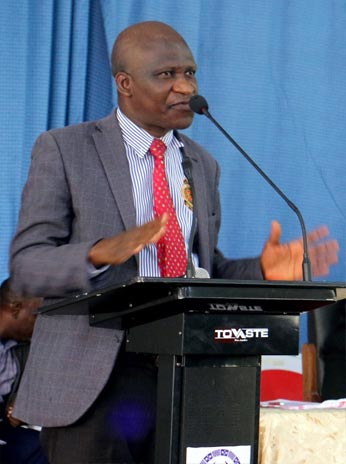
Declaring the programme open, the Vice-Chancellor, Prof. Ganiyu Olatunji Olatunde who welcomed all participants, especially the students, acknowledged the dire need for every human community to, as a matter of great concern, continue to appeal to the conscience of individuals not minding their status, age, or clan, in view of the current negative trend of suicide cases and related odds in the society. He, observed that the ugly trend was alien to OOU since there was no single record of suicide among its students and staff. However, in preventing future occurrence, the University Management has decided to be proactive by upgrading its security alertness, improving staff-student relationship, encouraging students to go for counselling and closely monitoring those students that are prone to commit suicide.
In his presentation, Dr. Bright Adetola of the Department of Sociology described suicide as a part of life usually caused by disconnection of an individual from significant others in a circle of relationship. He agreed with the Psychoanalytic Psychiatry School of Thought which opined that “every individual has suicide potential – a tendency to self-murder that is likely to be induced, perpetuated, or aggravated by certain social environment”. He further stressed that if social cohesion that provides psychic support for group members who were subjected to acute stress and anxiety were not put in place, as it used to be in Africa, suicide rates would continue to increase exponentially in the light of ever increasing predisposing factors to which the youths are subjected in contemporary society of Africa. He, thereafter, proposed that “demonstration of love as it used to be, should be re-established in our relationship where weak individuals are encouraged and not disparaged by the strong”. He added that it was not enough to communicate with everyone but reconnect with them with love, in order to reduce the rate of the phenomenon of suicide in the society.
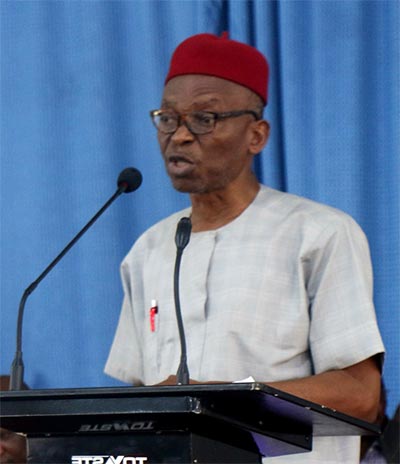
While emphasising good time management as a panacea to curbing a process that may lead to suicide attempts, the Dean, Students Affairs, Dr. Sefiu O. Oladunjoye in his lecture defined time as a common resource meant to measure activities of an individual which when properly managed has the attendant benefits of having less messy schedule, meeting deadlines, discovering opportunities in life and one’s career, and above all, being efficient and productive.
According to him “being efficiently engaged means your thoughts are far away from negative actions like theft, suicide and rape”. He also opined that “being with a particular burdensome issue does not mean you will not make it in life, it does not mean you are not going to accomplish much in life, as it is part of the events assigned to the time you are in”. He concluded that “with a little perseverance, patience and change of mind-set, all the grief would pass with time”. Dr. Oladunjoye further underscored that being efficiently engaged was also impactful on the society in terms of saving resources for the society and giving it some in return.
Dr. Muyiwa Adeyemi of the Guidance and Counselling Department, in his own presentation entitled “There is More to Life”, described suicide as the breakdown of the vital bond of life. He posited that the dilemmas and pressures of growing, coupled with the teenagers tendency to be more emotional and more impulsive make some young people to be vulnerable to suicidal and harmful activities. He stressed that suicidal actions could bring an end to one’s path to greatness in some different aspects of life including career pursuit, social personal involvement, growing up to face the realities of adult life, and life of service to others and the community. The Guidance and Counselling expert therefore, recommended positive thinking for individual to consider as an option in managing difficult situations and improve one’s personal and social health. This he said “does not necessarily translate to ignoring less pleasant situation in life but approaching it in more productive ways that usually started with self-talk that goes through one’s mind”
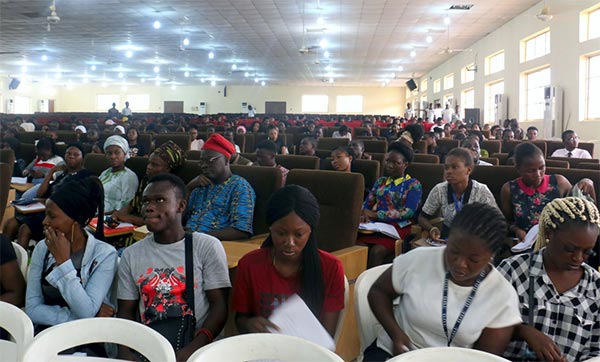
Mentioning some indices of self-talk that were negative in nature, Dr. Adeyemi said that they included catastrophizing, personalising, filtering, polarising, blaming, and relationship changes. He, however, remarked that identifying areas of change, checking one’s self, being open to humour, following a healthy lifestyle, surrounding oneself with positive people, practising positive self-talk, meditation etc, as ways out of the challenges of mind. He, thereafter, submitted that the discovery of the fact that those who have come out of harmful and suicidal thoughts and actions did so, having realised that “there is more to life than engaging in suicide”.
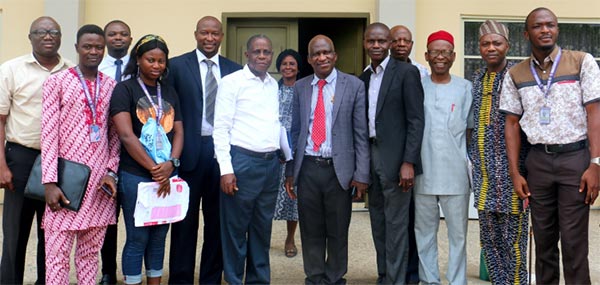
Similarly, Dr. I. K. Muo of the Business Administration Department appealed to the and opt for positive actions whenever an individual is faced with challenges that suggest suicidal actions, adding that “whatever can get worse, can also get better”. He was of the opinion that “a life that is always easy, is called to a lesser purpose”. He cited the life and times of great people world-over, whom he described as models worthy of emulation for refusing to give up inspite of series of trials, tribulations and damaging challenges. He disclosed that men in this category with their disability included Charles Dicken (lame), Plato (hunchback), Roosevelt (crippled by polio), Helen Keller (deaf and blind), Winston Churchill (devastating speech impediment), Albert Einstein (delayed speech). He thereafter, reiterated the need to remain focused, especially when life is dragging an individual back with difficulties, as it means, it’s going to launch one into greatness.
Similarly, the leadership of the two prominent religious bodies on campus represented by Dr. Dauda Egbeolowo, and Dr. S. A. Ajayi of the Muslim Community and the Christian Community respectively berated the alarming rate of suicide incidents in Nigeria and world-over, especially, among the youths. This, they attributed to situation of stress, depression, or grief that are naturally part of God’s plan for man, especially, the righteous prominent religious bodies on campus represented by Dr. Dauda Egbeolowo, and Dr. S. A. Ajayi of the Muslim Community and the Christian Community respectively berated the alarming rate of suicide incidents in Nigeria and world-over, especially, among the youths. This, they attributed to situation of stress, depression, or grief that are naturally part of God’s plan for man, especially, the righteous Hence several proactive policies and programmes in that direction. These included installation of surveillance camera within and outside the University campus premises, installation of solar-powered lights across the campus, constitution of Sexual Harassment Policy Committee, installation of awareness bill boards at strategic locations against indecent dressing, cult activities, examination malpractices, and suicide. Regular awareness campaign, seminars and lectures to sensitise students on trending phenomenon including the current campaign going on in all the campuses of the University are part of the strategies being employed by the Management to assist the students and make their stay on campus to be meaningful.


